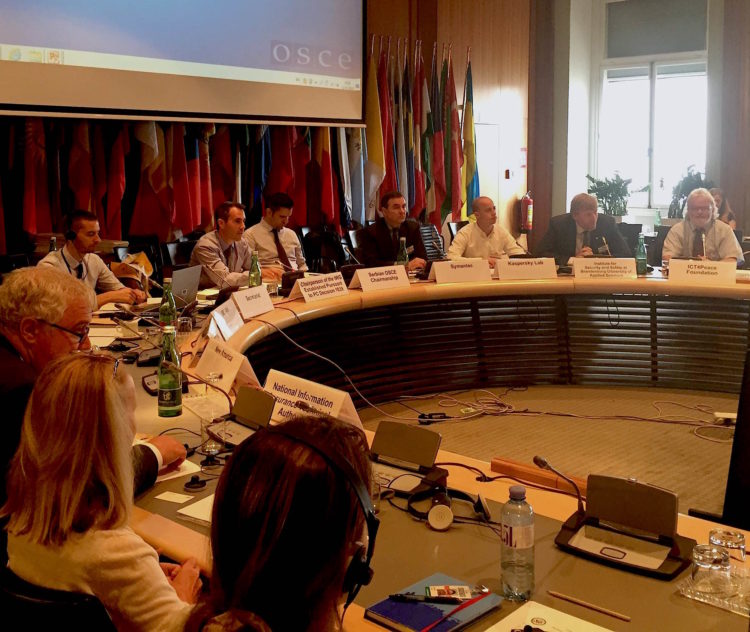
Daniel Stauffacher, President of ICT4Peace Foundation, was invited on 20 July 2015 by US Ambassador to the OSCE Daniel Baer, Chair of the OSCE Informal Working Group (IWG) on Confidence Building Measures in Vienna, to address participating States on the work of ICT4Peace on cyber/ICT security, and in particular on its training course for Diplomats on Cybersecurity Policy and Diplomacy. The Program of the informal workshop can be found here.
Daniel Stauffacher’s presentation can be found here.
In his statement, he underlined, that ICTs can be used for peaceful purposes but can also be detrimental to peace, trust and security:
“Over the past decade we have also witnessed how ICTs are increasingly used for purposes detrimental to peace and security, including hacking and other attacks on digital networks and systems, use of ICT for terrorist purposes. Traditional and social media are also being used to promote disharmony and conflict between and within countries and increasingly, to incite violence. The step from common crime to politically motivated acts, even terrorism, is not far.”
“Consequently, trust between states and between state and citizens is increasingly eroding by a range of state practices, including with regard to the negative uses of information communications technologies and related capabilities to advance political, military and economic goals. Despite a range of domestic and diplomatic efforts initiated to curb such practices, many states have rushed to develop these same capabilities to use not only against other states but against their own citizens, which further undermined confidence and trust between states, and between states and citizens”.
In order to meet the The Cyber Security Challenge, Daniel Stauffacher reiterated, that Civil Society, Academia and the Private Sector need in particular:
- to engage in an international discussion on the norms and principles of responsible state behavior in cyber space;
- to engage in developing Confidence Building Measures CBMs (e.g. Bilateral Agreements, OSCE, ARF, UN GGE);
- to engage in the development of cooperation between Governments, Private Sector, Civil society to ddress cybersecurity challenges and develop cooperation models;
- to reach out and include all Regions of the world and in particular Developing Countries and include them in the reflection of, consultations and negotiations on norms, CBMs through Capacity Building.
Daniel Stauffacher then presented the ICT4Peace Capacity Building Program for International Cyber Security Negotiations.
ICT4Peace Capacity Building Program for International Cyber Security Negotiations:
List of Cyber Security Diplomacy Courses carried out by ICT4Peace so far and in cooperation with:
- OAS in Bogota for Latin America (November 2014)
- Government of Kenya for East African Countries in Nairobi (March 2015)
- Government of the Netherlands at the Hague Global Conference on Cyberspace GCCS (April 2015)
Cyber Security Diplomacy Courses Planned:
- With Government of Singapore for ASEAN Countries (19 and 20 October 2015)
- With African Union for African Countries (15 and 16 February 2016)
- With the Geneva Center for Security Policy (GCSP) for the Diplomatic Community in Geneva (March 2016).
This capacity building program is generously supported by the Governments of UK, Germany, Switzerland, Kenya, Netherlands, Singapore, Canada, US, Australia.
2. Long Term Objectives of the Course:
Mitigating risks to both rights and security in the cyber-sphere through the promotion of international norms of responsible state behavior, confidence-building measures (CBMs), and international cooperation.
3. The expected long-term impact:
- More inclusive and knowledge-based debates, consultations or negotiations with and by all regions on norms and CBMs, with all stake-holders: Governments, industry, civil society, including academia;
- More agreements at bilateral, regional at global level on norms, CBMs and international cooperation;
- Progress towards a sustained open, prosperous, trustworthy, safe and secure cyberspace.
4. The Short Term Objectives of the course:
- A better and more detailed understanding by public officials, diplomats, industry, civil society representatives from all regions of the world of international norms, CBMs and international cooperation in the Cyber space;
- To broaden the participation in the international debates and regional and global negotiations in fora such as the London Process, UN GGE, OSCE, ASEAN, OAS, in the EU, the AU and AP-CERT;
- A better understanding of the concerns, best practices, policies and institutional arrangements in the field of cyber security at the regional level;
- Build a network of alumni, lecturers and experts of the workshop course, to up-date and exchange information on future developments in the global and regional international cyber security debate, research and negotiations
